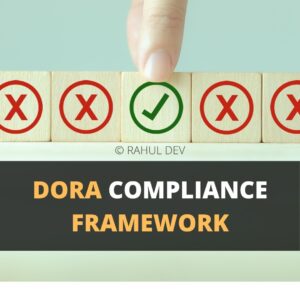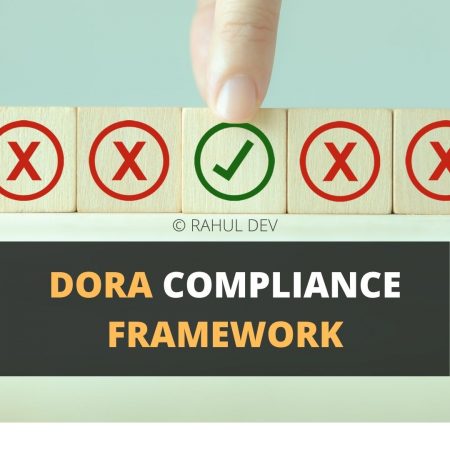Digital Operational Resilience Act
Explore the Process to Develop DORA Compliance Checklist

Understand Practical Aspects
Understand how to review DORA requirements

Explore the Process to Develop DORA Compliance Checklist

Understand how to review DORA requirements

Protect your innovations across multiple countries and create strong patent portfolio to boost business valuation
Local and global brand protection through international trademark registrations
Extensive research and business writing for technical whitepapers and B2B content products
As an important EU regulation, the Digital Operational Resilience Act (DORA) seeks to strengthen the digital resilience of financial institutions. The role of a Digital Operational Resilience Act specialist covers examining the fundamental elements of DORA, including protocols, specialized sections, and preparing DORA compliance frameworks that financial entities are required to follow to guarantee a resilient digital operational environment. The effectiveness of DORA in fortifying digital infrastructures against a wide range of cyber threats is emphasized through the extensive review of authoritative academic papers, industry reports, and regulatory guidelines, with a particular emphasis on operational resilience, risk management, and adherence to regulatory standards, as discussed herein. Digital Operational Resilience Act (DORA) primarily covers cybersecurity, third-party risk management, incident reporting, operational resilience testing, and cyber stress testing, which are the five key areas on which this regulation focuses in an effort to protect financial services firms and their clients from cyberattacks.
This article covers following topics:
Framework for Strategic Risk Management
Preparing DORA Governance Frameworks
Enhanced Incident Reporting and Third-Party Risk Administration

The Digital Operational Resilience Act (DORA) mandates a strategic and comprehensive framework for managing digital risks, pivotal for safeguarding the operational stability of financial institutions in the European Union. This regulation is part of an evolving landscape where organizations are compelled not just to respond to incidents as they occur but to actively anticipate and prepare for potential digital threats. The proactive risk management approach promoted by DORA aligns with broader EU guidance on cybersecurity and resilience, aiming to boost a culture of preparedness and agility within financial entities.
A fundamental component of this strategic framework is the implementation of comprehensive testing and reporting mechanisms. These mechanisms are critical as they ensure that institutions do not merely react to disruptions but are consistently evolving their defenses in anticipation of them. For instance, stress testing and scenario analysis are employed to simulate a range of disruptions, from cyber-attacks to system failures, ensuring that the institution can respond effectively under different crisis conditions. This is exemplified by a case study involving a major European bank that implemented an advanced cyber resilience testing protocol. Following the introduction of this protocol, the bank reported a significant enhancement in its ability to detect and mitigate breaches before they could escalate into more severe security incidents.
Moreover, the regulation’s emphasis on regular reporting enhances transparency and accountability, facilitating better oversight and compliance. Financial entities are required to document and report any significant digital disruptions to regulatory bodies, ensuring a loop of continuous feedback and improvement. This process not only helps in fine-tuning risk management practices but also in setting industry benchmarks for digital resilience. A notable example is seen in the annual reports published by financial institutions, which have begun to detail not only the financial impacts of digital risks but also the strategic initiatives undertaken to mitigate such risks. The strategic risk management framework under DORA is thus not a static compliance requirement but a dynamic process that fosters ongoing enhancements and adjustments in response to the rapidly changing digital landscape.
As it is well-known, the DORA provisions specify governance requirements specific to the management of Information and Communication Technology (ICT) risks. DORA particularly outlines roles and responsibilities, ensuring that every tier of an organization is cognizant and compliant with the regulatory expectations. This rigorous structuring profoundly impacts the operational dynamics of financial institutions.
From my consultancy experience, it is evident that the enforcement of these detailed governance roles promotes a corporate culture steeped in accountability and progressive enhancement. The inclusion of digital resilience within boardroom discussions exemplifies a strategic alignment with broader organizational goals, melding technological resilience with business continuity planning. Financial entities are increasingly integrating ICT risk management into their core strategic frameworks, prompted by regulatory mandates such as DORA.
A practical example can be observed in a major European bank that recently overhauled its ICT governance structure to comply with DORA. The bank implemented a centralized digital risk management team, responsible for overseeing all digital operations and compliance across the organization. This team directly reports to the board, ensuring that top-level decisions reflect an acute awareness of digital operational risks.
Moreover, case studies indicate that institutions adhering to DORA’s governance requirements often witness enhanced operational resilience and are better positioned to handle ICT disruptions. For instance, a case study involving a financial services firm showed that after aligning its governance framework with DORA standards, the firm experienced a noticeable reduction in downtime incidents. This alignment not only complied with regulatory frameworks but also significantly mitigated financial risks associated with ICT failures.
The Digital Operational Resilience Act (DORA) is set to play a crucial role in setting comprehensive standards for incident reporting and third-party risk management. Enhanced incident reporting protocols under DORA not only enhance transparency but also facilitate regulatory oversight and collective industry progress through knowledge sharing. For example, a European bank recently demonstrated its resilience maturity by rapidly reporting a cybersecurity breach, which not only complied with DORA regulations but also helped the broader financial community by sharing mitigation strategies.
The growing reliance on third-party service providers has necessitated stringent DORA compliance frameworks to ensure robust oversight. The regulations mandate detailed contracts and ongoing supervision, a requirement echoed by numerous industry reports highlighting the increased incidence of third-party failures. A case in point involves a financial institution that mitigated potential disruptions through comprehensive audits of its service providers, illustrating the practical application of DORA in safeguarding against external vulnerabilities.
DORA’s insistence on continuous improvement through benchmarking and regular audits aligns with emerging technologies and regulatory changes. This process is not static; rather, it requires financial institutions to engage in perpetual enhancement of their compliance practices. For instance, a leading investment firm conducts semi-annual reviews of its compliance measures, comparing them against both industry benchmarks and evolving DORA standards to ensure best practices in digital resilience.
Furthermore, DORA necessitates specialized training and awareness programs to equip personnel with the necessary skills to effectively manage digital risks. These programs are critical for fostering a culture of resilience within organizations. A notable implementation of this is seen in a multinational bank that developed a DORA-focused curriculum to train its staff, significantly reducing incident response times and enhancing risk awareness across its operations.
Lastly, leveraging compliance with DORA regulations offers a unique competitive advantage. Financial entities that adhere strictly to these standards not only mitigate risks effectively but also enhance their market reputation, building trust with clients and investors. An example includes a financial services firm that used its DORA compliance status as a key point in its marketing and client engagement strategies, subsequently observing increased investor confidence and market share. Therefore, the integration of DORA regulations into the operational strategies of financial institutions is imperative for maintaining digital resilience. The act’s comprehensive scope, from incident reporting to third-party management and continuous improvement, provides a robust framework for addressing the multifaceted challenges posed by the digital age. As regulations evolve, so too must the strategies of those they govern, ensuring that resilience remains at the forefront of the financial sector’s priorities.
A critical responsibility of a Digital Operational Resilience Act Specialist is to ensure adherence to DORA regulations. The DORA specialist assumes the role of comprehending the technical criteria established by DORA, devising approaches to adhere to said criteria, and providing direction to the organization regarding the process of compliance. Their proficiency aids financial institutions in maintaining operational resilience and staying clear of emerging cybersecurity threats.
To prepare a compliance framework for DORA, financial entities are obligated to comply with a comprehensive set of requirements comprising the DORA compliance framework. The referenced measures include the creation of a comprehensive testing program for digital operational resilience, the establishment of a framework for managing ICT risk, and the formulation of a strategy to oversee third-party ICT risk. In use, under the DORA blueprint prepared by the DORA advisor, financial institutions can adhere to DORA compliance by implementing a checklist that outlines essential measures. These measures consist of identifying and evaluating ICT risks, developing an ICT risk management framework, performing routine tests to ensure the resilience of digital operations, and notifying the appropriate authorities of significant ICT-related incidents.
By integrating authority, trust, and internal and external expertise, financial institutions can effectively navigate the evolving landscape of DORA compliance. This includes actively involving oneself in discussions with DORA specialists, cooperating with industry peers, and remaining updated on regulatory advancements. Institutions can cultivate confidence among regulators, clients, and other stakeholders by exhibiting expertise in comprehending and applying DORA obligations.
DORA places significant emphasis on the criticality of cyber resilience within the financial sector, with the objective of safeguarding financial entities against cyber threats and maintaining the integrity of the financial system (Source: AdvPrashantMali). Financial institutions must maintain operational resilience and comply with DORA by investing in cybersecurity measures such as risk assessments, incident response plans, and continuous monitoring.
The Digital Operational Resilience Act provides financial institutions with a comprehensive regulatory framework to enhance their digital fortification in the face of cyber threats. Financial entities can surmount this intricate regulatory environment and guarantee adherence by the 2025 deadline by acquiring knowledge of the fundamental elements of DORA, such as compliance frameworks, specialist positions, and checklists. Financial institutions must incorporate trust, authority, and expertise into the DORA compliance process in order to safeguard their clients against the ever-changing cybersecurity threats of the digital age and preserve operational resilience.

As a business coach and thought leader, I cannot emphasize enough the importance of innovation, new software patents, mobile apps, and patents for tech companies, startups, and entrepreneurs. The world is rapidly evolving, and staying ahead of the curve is vital for success. Embracing technological advancements such as blockchain and AI can unlock unprecedented opportunities, streamline operations, and propel businesses into the future with competitive valuation via intangible assets.
Click Here for AI Startup Valuation Guide.
For instance, blockchain technology can revolutionize supply chain management and secure data sharing wherein innovative business models are explained to the audience via technical whitepapers, while AI can automate and optimize decision-making processes. Mobile apps are no longer just a luxury; they have become essential tools for engaging customers and offering personalized experiences. Furthermore, securing digital innovation patents is crucial for protecting intellectual property, fostering innovation, and maintaining a competitive edge. By investing in these areas, businesses can position themselves as industry pioneers and pave the way for a prosperous future after thoroughly conducting the due diligence and reviewing the legal opinion letters, which in case of digital assets can assist in determining the tokens as utility assets or coins as utility tokens before listing the assets at an exchange.
Our team of advanced patent attorneys assists clients with patent searches, drafting patent applications, and patent (intellectual property) agreements, including licensing and non-disclosure agreements. Advocate Rahul Dev is a Patent Attorney & International Business Lawyer practicing Technology, Intellectual Property & Corporate Laws. He is reachable at rd (at) patentbusinesslawyer (dot) com & @rdpatentlawyer on Twitter.
Quoted in and contributed to 50+ national & international publications (Bloomberg, FirstPost, SwissInfo, Outlook Money, Yahoo News, Times of India, Economic Times, Business Standard, Quartz, Global Legal Post, International Bar Association, LawAsia, BioSpectrum Asia, Digital News Asia, e27, Leaders Speak, Entrepreneur India, VCCircle, AutoTech).
Regularly invited to speak at international & national platforms (conferences, TV channels, seminars, corporate trainings, government workshops) on technology, patents, business strategy, legal developments, leadership & management.
Working closely with patent attorneys along with international law firms with significant experience with lawyers in Asia Pacific providing services to clients in US and Europe. Flagship services include international patent and trademark filings, patent services in India and global patent consulting services.
Global Blockchain Lawyers (www.GlobalBlockchainLawyers.com) is a digital platform to discuss legal issues, latest technology and legal developments, and applicable laws in the dynamic field of Digital Currency, Blockchain, Bitcoin, Cryptocurrency and raising capital through the sale of tokens or coins (ICO or Initial Coin Offerings).
Blockchain ecosystem in India is evolving at a rapid pace and a proactive legal approach is required by blockchain lawyers in India to understand the complex nature of applicable laws and regulations.